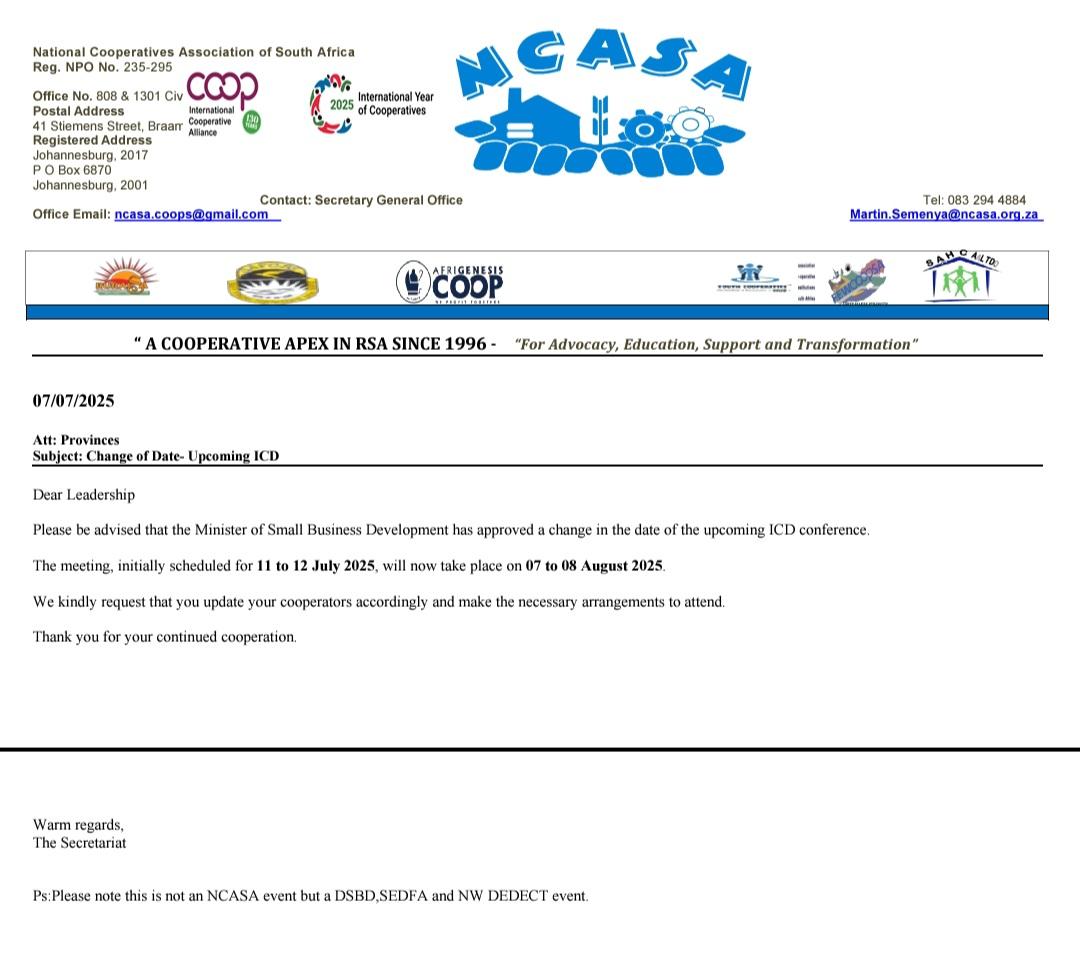0 Commentaires
0 Parts
3KB Vue
0 Aperçu
Annuaire
Find cooperators, create new connections and make new friends
-
Connectez-vous pour aimer, partager et commenter!
-
0 Commentaires 0 Parts 399 Vue 0 Aperçu
-
0 Commentaires 0 Parts 434 Vue 0 Aperçu
-
0 Commentaires 0 Parts 431 Vue 0 Aperçu
-
0 Commentaires 0 Parts 428 Vue 0 Aperçu
-
What is a cooperative? A cooperative is an autonomous association of persons united voluntarily to meet their common economic, social and cultural needs and aspirations through a jointly and democratically controlled enterprise.
As self-help organisations, cooperatives in both developing and developed countries
help raise the income and employment prospects of its members. The strength and reach
of cooperatives are illustrated by the success of both small and large scale farmers in India
who help 11 million families earn part of their income from dairy cooperatives.
In Africa, cocoa and coffee growing cooperatives, which have a considerable export market, reinvest profits in their communities to obtain potable water, sanitation facilities, and resources for local villages. Cooperatives are also multi-billion dollar businesses, such as Sunkist and Ocean Spray, as well as self-organised artisans and rural farmers.
The Associated Press, one of the oldest cooperatives, employs 3,700 people and provides current news to 121 countries in five languages. Thus cooperatives can be a source for information, credit, food, social protection, housing, and job creation.
https://www.un.org/esa/socdev/social/cooperatives/documents/CoopsAtWork.pdf
What is a cooperative? A cooperative is an autonomous association of persons united voluntarily to meet their common economic, social and cultural needs and aspirations through a jointly and democratically controlled enterprise. As self-help organisations, cooperatives in both developing and developed countries help raise the income and employment prospects of its members. The strength and reach of cooperatives are illustrated by the success of both small and large scale farmers in India who help 11 million families earn part of their income from dairy cooperatives. In Africa, cocoa and coffee growing cooperatives, which have a considerable export market, reinvest profits in their communities to obtain potable water, sanitation facilities, and resources for local villages. Cooperatives are also multi-billion dollar businesses, such as Sunkist and Ocean Spray, as well as self-organised artisans and rural farmers. The Associated Press, one of the oldest cooperatives, employs 3,700 people and provides current news to 121 countries in five languages. Thus cooperatives can be a source for information, credit, food, social protection, housing, and job creation. https://www.un.org/esa/socdev/social/cooperatives/documents/CoopsAtWork.pdfType de fichier: pdf0 Commentaires 0 Parts 731 Vue 0 Aperçu -
https://www.ilo.org/meetings-and-events/cooperatives-advancing-youth-employment-sustainable-development0 Commentaires 0 Parts 488 Vue 0 Aperçu
-
National Cooperatives Association Of South AfricaAjout d'un fichier2025-07-19 14:24:46 - Traduire -The Comprehensive Agricultural Support Programme (CASP) is a South African government initiative designed to enhance agricultural development, particularly for smallholder farmers. It provides financial and technical assistance to support various aspects of agricultural production, including infrastructure, training, marketing, and access to information.
Key features of CASP include:
Target Beneficiaries:
CASP focuses on supporting smallholder farmers, land reform beneficiaries, farm workers, and small agribusinesses, including women and youth in agriculture.
Six Pillars of Support:
The program is structured around six key pillars:
On and off-farm infrastructure and production inputs: This includes support for building and improving infrastructure like irrigation systems, storage facilities, and providing essential inputs like seeds and fertilizers.
Targeted training, skills development, and capacity building: CASP provides training programs to enhance farmers' skills in areas like crop production, livestock management, and business management.
Marketing and business development: The program assists farmers in accessing markets for their produce and developing business plans to improve profitability.
Information and knowledge management: CASP provides access to relevant agricultural information and resources, including market information, best practices, and technical advice.
Technical, advisory, and regulatory services: This includes access to expert advice on various agricultural practices, as well as assistance with navigating regulations related to farming.
Financial services: CASP aims to improve access to financial resources for farmers, potentially through partnerships with financial institutions.
Promoting Sustainable Practices:
A key objective of CASP is to promote sustainable agricultural practices that ensure long-term productivity and environmental stewardship.
Improving Food Security:
By supporting increased agricultural production and efficiency, CASP contributes to improved food security for the targeted communities and the nation as a whole.
Provincial Implementation:
The program is implemented by provincial departments of agriculture, working in collaboration with various stakeholders, including the Department of Agriculture, Land Reform and Rural Development (DALRRD).The Comprehensive Agricultural Support Programme (CASP) is a South African government initiative designed to enhance agricultural development, particularly for smallholder farmers. It provides financial and technical assistance to support various aspects of agricultural production, including infrastructure, training, marketing, and access to information. Key features of CASP include: Target Beneficiaries: CASP focuses on supporting smallholder farmers, land reform beneficiaries, farm workers, and small agribusinesses, including women and youth in agriculture. Six Pillars of Support: The program is structured around six key pillars: On and off-farm infrastructure and production inputs: This includes support for building and improving infrastructure like irrigation systems, storage facilities, and providing essential inputs like seeds and fertilizers. Targeted training, skills development, and capacity building: CASP provides training programs to enhance farmers' skills in areas like crop production, livestock management, and business management. Marketing and business development: The program assists farmers in accessing markets for their produce and developing business plans to improve profitability. Information and knowledge management: CASP provides access to relevant agricultural information and resources, including market information, best practices, and technical advice. Technical, advisory, and regulatory services: This includes access to expert advice on various agricultural practices, as well as assistance with navigating regulations related to farming. Financial services: CASP aims to improve access to financial resources for farmers, potentially through partnerships with financial institutions. Promoting Sustainable Practices: A key objective of CASP is to promote sustainable agricultural practices that ensure long-term productivity and environmental stewardship. Improving Food Security: By supporting increased agricultural production and efficiency, CASP contributes to improved food security for the targeted communities and the nation as a whole. Provincial Implementation: The program is implemented by provincial departments of agriculture, working in collaboration with various stakeholders, including the Department of Agriculture, Land Reform and Rural Development (DALRRD).Type de fichier: pdf0 Commentaires 0 Parts 746 Vue 0 Aperçu -
National Cooperatives Association Of South Africaa ajouté une photo2025-07-19 14:42:27 - Traduire -The Comprehensive Agricultural Support Programme (CASP) is a South African government initiative designed to enhance agricultural development, particularly for smallholder farmers. It provides financial and technical assistance to support various aspects of agricultural production, including infrastructure, training, marketing, and access to information.
Key features of CASP include:
Target Beneficiaries:
CASP focuses on supporting smallholder farmers, land reform beneficiaries, farm workers, and small agribusinesses, including women and youth in agriculture.
Six Pillars of Support:
The program is structured around six key pillars:
On and off-farm infrastructure and production inputs: This includes support for building and improving infrastructure like irrigation systems, storage facilities, and providing essential inputs like seeds and fertilizers.
Targeted training, skills development, and capacity building: CASP provides training programs to enhance farmers' skills in areas like crop production, livestock management, and business management.
Marketing and business development: The program assists farmers in accessing markets for their produce and developing business plans to improve profitability.
Information and knowledge management: CASP provides access to relevant agricultural information and resources, including market information, best practices, and technical advice.
Technical, advisory, and regulatory services: This includes access to expert advice on various agricultural practices, as well as assistance with navigating regulations related to farming.
Financial services: CASP aims to improve access to financial resources for farmers, potentially through partnerships with financial institutions.
Promoting Sustainable Practices:
A key objective of CASP is to promote sustainable agricultural practices that ensure long-term productivity and environmental stewardship.
Improving Food Security:
By supporting increased agricultural production and efficiency, CASP contributes to improved food security for the targeted communities and the nation as a whole.
Provincial Implementation:
The program is implemented by provincial departments of agriculture, working in collaboration with various stakeholders, including the Department of Agriculture, Land Reform and Rural Development (DALRRD).The Comprehensive Agricultural Support Programme (CASP) is a South African government initiative designed to enhance agricultural development, particularly for smallholder farmers. It provides financial and technical assistance to support various aspects of agricultural production, including infrastructure, training, marketing, and access to information. Key features of CASP include: Target Beneficiaries: CASP focuses on supporting smallholder farmers, land reform beneficiaries, farm workers, and small agribusinesses, including women and youth in agriculture. Six Pillars of Support: The program is structured around six key pillars: On and off-farm infrastructure and production inputs: This includes support for building and improving infrastructure like irrigation systems, storage facilities, and providing essential inputs like seeds and fertilizers. Targeted training, skills development, and capacity building: CASP provides training programs to enhance farmers' skills in areas like crop production, livestock management, and business management. Marketing and business development: The program assists farmers in accessing markets for their produce and developing business plans to improve profitability. Information and knowledge management: CASP provides access to relevant agricultural information and resources, including market information, best practices, and technical advice. Technical, advisory, and regulatory services: This includes access to expert advice on various agricultural practices, as well as assistance with navigating regulations related to farming. Financial services: CASP aims to improve access to financial resources for farmers, potentially through partnerships with financial institutions. Promoting Sustainable Practices: A key objective of CASP is to promote sustainable agricultural practices that ensure long-term productivity and environmental stewardship. Improving Food Security: By supporting increased agricultural production and efficiency, CASP contributes to improved food security for the targeted communities and the nation as a whole. Provincial Implementation: The program is implemented by provincial departments of agriculture, working in collaboration with various stakeholders, including the Department of Agriculture, Land Reform and Rural Development (DALRRD).0 Commentaires 0 Parts 801 Vue 0 Aperçu -
National Cooperatives Association Of South AfricaAjout d'un fichier2025-07-19 14:44:19 - Traduire -General information: Stats SA publishes approximately 300 different statistical releases each year. It is not economically viable to produce them in more than one of South Africa's 12 official languages. Since the releases are used extensively locally and by international economic and social-scientific communities, Stats SA releases are published in English only. Stats SA has copyright on this publication. Users may apply the information as they wish, provided that they acknowledge Stats SA as the source of the basic data wherever they process, apply, utilise, publish or distribute the data; and also that they specify that the relevant application and analysis (where applicable) result from their own processing of the data.General information: Stats SA publishes approximately 300 different statistical releases each year. It is not economically viable to produce them in more than one of South Africa's 12 official languages. Since the releases are used extensively locally and by international economic and social-scientific communities, Stats SA releases are published in English only. Stats SA has copyright on this publication. Users may apply the information as they wish, provided that they acknowledge Stats SA as the source of the basic data wherever they process, apply, utilise, publish or distribute the data; and also that they specify that the relevant application and analysis (where applicable) result from their own processing of the data.Type de fichier: pdf0 Commentaires 0 Parts 633 Vue 0 Aperçu
Commandité

Join eduBox Consumer Co-op for your kids freee health insurance benefits
Join the eduBox Consumer Co-op today and start saving smart! For a small monthly contribution per student, you’ll enjoy massive discounts on school supplies bought in bulk before each term...









